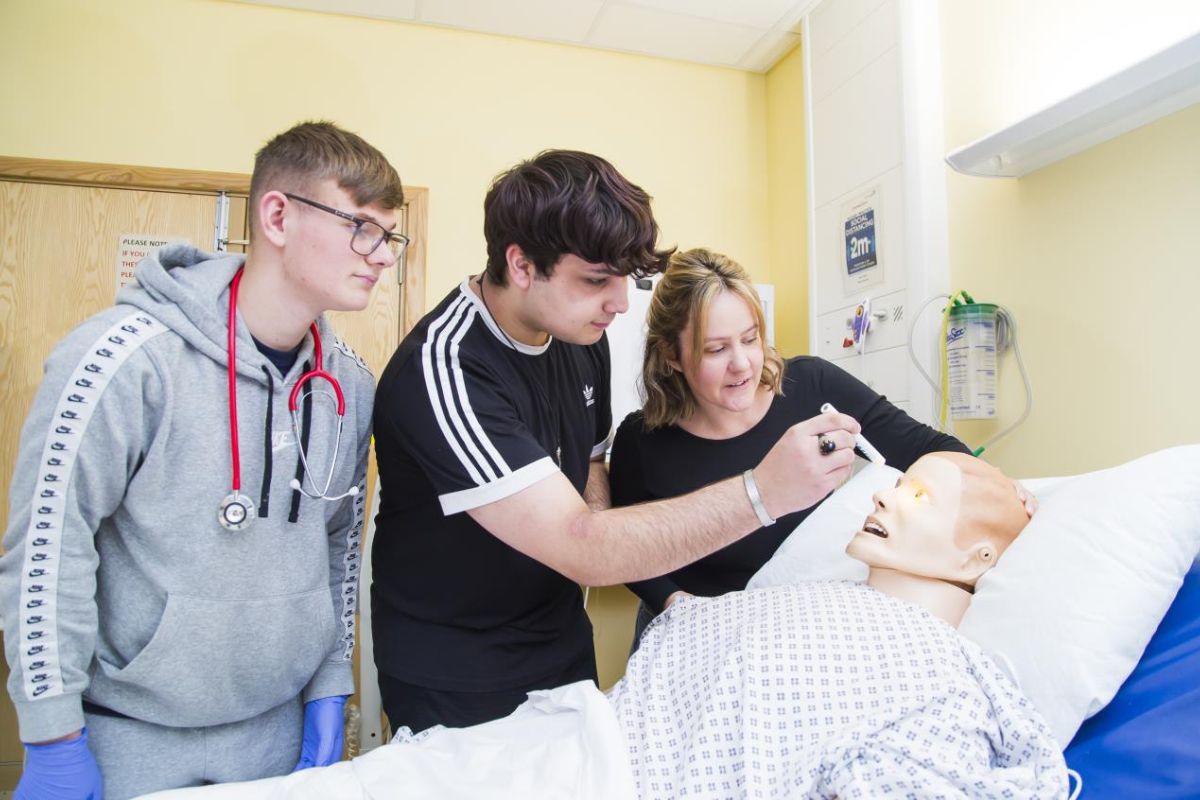Unique pilot aiming to help train social care workforce of the future

A first-of-its-kind project investigating the use of virtual reality (VR) and simulation centres to better prepare learners to enter the health and social care workforce has highlighted the need to access these teaching and assessment methods at a college level.
The pilot study by Calderdale College and supported by NCFE’s Assessment Innovation Fund, aimed to demonstrate the capabilities of Level 2 and Level 3 students when presented with immersive technologies – something that’s already offered in Higher Education and within clinical environments.
Students overall found the simulation experiences engaging and enjoyable. They felt they were realistic and could describe new learning that occurred through their participation. It’s hoped that this approach could have a significant impact on the social care workforce by attracting increased numbers of younger workers into a sector with just 8% under the age of 25.
Jo Jones, Head of Faculty at Calderdale College, said:
“Students enjoyed experiencing immersive learning environments to navigate and practice essential skills as part of their learning journey.
“There were real opportunities to align theoretical knowledge with practical application through the use of scenarios mirroring expectations and the challenges encountered in the health and social care sector. This is helping us to support the transition of students into professional practice.”
Calderdale College worked with a range of partners on the project, including NHS England, Skills for Care, the University of Leeds, and Huddersfield Royal Infirmary, who provided access to its simulation centre, as well as employers including eight local care homes.
By integrating VR and simulation centres into the assessment of core curriculum, the project created dynamic, real-life scenarios that not only replicate industry standards, but also provide a distinctive and safe space for experiential learning.
According to the latest Skills for Care report, the adult social care workforce in England needs to grow by 25% (440,000 additional posts) by 2035. The average age of the workforce is 45 and 44% of the workforce with direct care roles have a Level 3 qualification or below.
There’s a need to professionalise the sector, as well as create a younger talent pipeline, but further education (FE) is often far behind higher education when it comes to accessing the most innovative teaching and assessment methods.
Sean Bradbury, Technology Enhanced Learning Team at NHS England, said:
“This is probably the best example I’ve seen of using immersive learning in an FE setting. The learners coming through FEs are a key part of the workforce. This is just the first step in their career, so whether they go onto a placement, into working in an organisation, or going on to their higher studies, what they do here it sets them up for that journey.”
As part of the pilot, Calderdale College also looked at the role FE could play in delivering some of the Care Certificate Standards, which are mandatory when working in social care.
The Care Certificate is not currently a passport that employees carry with them from one employer to the next and must be completed each time someone enters a new workplace. This comes at a cost to the employer of approximately £1,000 per employee, due to the time and resources needed to teach and sign off each competency.
Delivering mandatory training at college level could help support staff retention and recruitment across the sector by preparing students for what they will encounter in the workplace as well as easing the strain on employers by giving young people the necessary standards before they leave the classroom.
The project has been supported by a grant from NCFE’s Assessment Innovation Fund which has already invested £1 million to help organisations with new approaches to assessment to explore innovative uses of technology.
Dean Blewitt, Senior Investments and Innovations Manager at NCFE, said:
“This pilot project provides a glimpse into the promising future of VR and simulation centres in social care education. While challenges remain, the potential for placing learners at the heart of engaging, realistic, and personalised learning experiences cannot be ignored.
“By carefully addressing these challenges and embracing continuous improvement, we can empower our future healthcare professionals with the skills and confidence they need to thrive in a rapidly evolving world.”
Supported by NCFE and Ufi VocTech Trust, the next round of the Assessment Innovation Fund is now open to applications and focuses on assessment within vocational education, helping UK adults develop the skills they need to gain and maintain employment.
Two organisations will be awarded up to £150,000 each and the fund welcomes applications from training providers, awarding organisations, EdTech businesses, colleges, and others interested in changing the future of assessment.
While more research like the project conducted by Calderdale College is needed when it comes to the use of immersive technology in FE, the hope is that by making social care an attractive and engaging learning experience it could create a talent pipeline into the sector and redress the current recruitment and skills shortages.
To find out more information about the pilot and to read the final report, visit here.











Responses